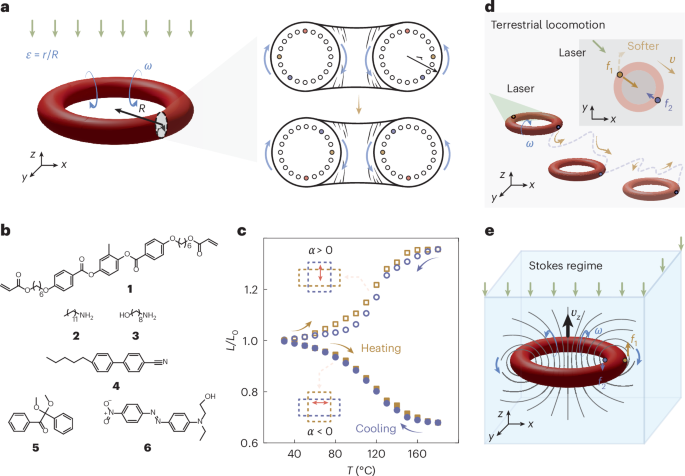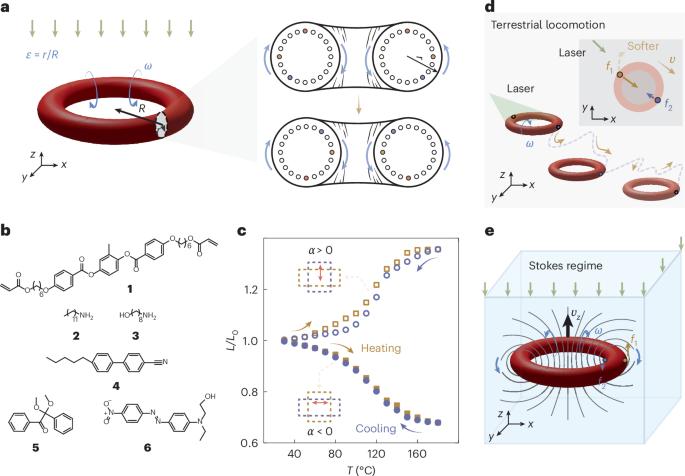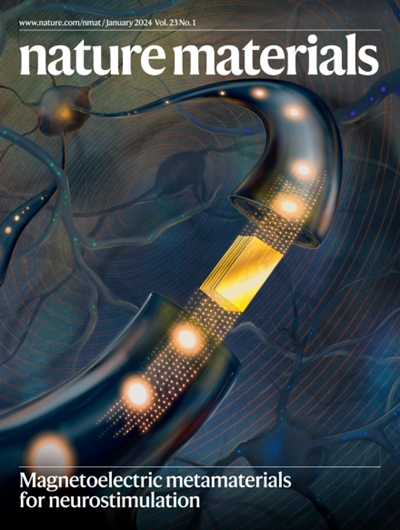Light-steerable locomotion using zero-elastic-energy modes
IF 37.2
1区 材料科学
Q1 CHEMISTRY, PHYSICAL
引用次数: 0
Abstract
Driving synthetic materials out of equilibrium via dissipative mechanisms paves the way towards autonomous, self-sustained robotic motions. However, obtaining agile movement in diverse environments with dynamic steerability remains a challenge. Here we report a light-fuelled soft liquid crystal elastomer torus with self-sustained out-of-equilibrium movement. Under constant light excitation, the torus undergoes spontaneous rotation arising from the formation of zero-elastic-energy modes. By exploiting dynamic friction or drag, the zero-elastic-energy-mode-based locomotion direction can be optically controlled in various dry and fluid environments. We demonstrate the ability of the liquid crystal elastomer torus to laterally and vertically swim in the Stokes regime. The torus navigation can be extended to three-dimensional space with full steerability of the swimming direction. These results demonstrate the possibilities enabled by prestrained topological structures towards robotic functions of out-of-equilibrium soft matter. Zero-elastic-energy modes drive the self-sustained locomotion of a liquid crystal elastomer torus across various environments.


利用零弹性能量模式的轻型稳定运动
通过耗散机制使合成材料失去平衡,为实现自主、自持的机器人运动铺平了道路。然而,要在不同环境中实现具有动态转向能力的灵活运动仍然是一项挑战。在此,我们报告了一种以光为动力、能自我维持失衡运动的软液晶弹性体环。在恒定的光激励下,环形物会因零弹性能量模式的形成而发生自发旋转。通过利用动态摩擦或阻力,基于零弹性能量模式的运动方向可以在各种干燥和流体环境中进行光学控制。我们展示了液晶弹性体环在斯托克斯状态下横向和纵向游动的能力。环体导航可扩展到三维空间,游动方向完全可控。这些结果表明了预约束拓扑结构在实现非平衡软物质机器人功能方面的可能性。
本文章由计算机程序翻译,如有差异,请以英文原文为准。
求助全文
约1分钟内获得全文
求助全文
来源期刊

Nature Materials
工程技术-材料科学:综合
CiteScore
62.20
自引率
0.70%
发文量
221
审稿时长
3.2 months
期刊介绍:
Nature Materials is a monthly multi-disciplinary journal aimed at bringing together cutting-edge research across the entire spectrum of materials science and engineering. It covers all applied and fundamental aspects of the synthesis/processing, structure/composition, properties, and performance of materials. The journal recognizes that materials research has an increasing impact on classical disciplines such as physics, chemistry, and biology.
Additionally, Nature Materials provides a forum for the development of a common identity among materials scientists and encourages interdisciplinary collaboration. It takes an integrated and balanced approach to all areas of materials research, fostering the exchange of ideas between scientists involved in different disciplines.
Nature Materials is an invaluable resource for scientists in academia and industry who are active in discovering and developing materials and materials-related concepts. It offers engaging and informative papers of exceptional significance and quality, with the aim of influencing the development of society in the future.
 求助内容:
求助内容: 应助结果提醒方式:
应助结果提醒方式:


